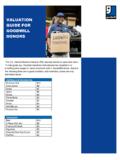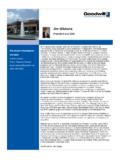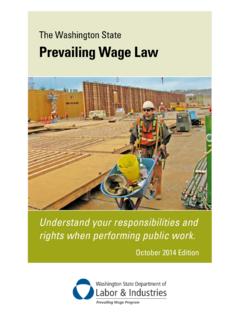Transcription of Employment of People with Disabilities through FLSA ...
1 Employment of People with Disabilities through FLSA Section 14(c) Abstract goodwill Industries International provides job training and placement services to millions of People in the United States and Canada every year, including million in 2012 alone. Many of those who receive these services have Disabilities that limit their productivity, making it hard for them to find work. goodwill believes that work is a valued activity that enables People to participate fully in their lives. Unfortunately, those with significant Disabilities have limited job opportunities, which would be even more limited if not for a special provision in the Fair Labor Standards Act (FLSA). Section 14(c) of the FLSA allows employers to pay wages below the federal minimum to employees who have Disabilities that directly affect their job performance.
2 Employers are able to do this through a special minimum wage certificate obtained from the Department of Labor s Wage and Hour Division. This paper provides an overview of Section 14(c), discusses why preserving the tool is important to individuals with Disabilities and to goodwill , and provides recommendations to strengthen the use of special minimum wage certificates. For more information: Laura Walling, JD goodwill Industries International Director of Advocacy and Legislative Affairs (240) 333-5378 2 2 Table of Contents Introduction to FLSA Section 14(c) .. 4 FLSA Section 14(c) and goodwill .. 7 Issues of Concern .. 8 The Solution .. 10 Recommended Action .. 14 The information contained in this document represents the current view of goodwill Industries International on the issues discussed as of the date of publication.
3 This document is for informational purposes only. goodwill Industries International makes no warranties, express or implied, in this document. goodwill and goodwill Industries are registered trademarks. Other product and company names mentioned herein may be the trademarks of their respective owners. goodwill Industries International 15810 Indianola Drive Rockville, MD 20855 USA 3 4 4 Introduction to FLSA Section 14(c) Section 14(c) of the Fair Labor Standards Act (FLSA) helps People with Disabilities compete for jobs. It grants employers who receive a certificate from the Department of Labor s (DOL) Wage and Hour Division (WHD) to pay special minimum wages to employees who have Disabilities if their Disabilities directly impact their ability to perform on the The original intent of Section 14(c) can be traced back to the National Industrial Recovery Act (NIRA) of 1933 The NIRA established a productivity-based wage arranged through a system of certificates for persons with Disabilities .
4 In competitive industry, such workers were payable at 75 percent of the industry minimum. In center-based work centers3, there was no wage floor. In 1938, the passage of the FLSA reestablished the certification system under Section Also under Section 14(c), the special minimum wage rate must be commensurate with those rates paid to workers without Disabilities in the region for essentially the same type, quantity and quality of work. Employers must obtain a special minimum wage certificate to pay commensurate wages and provide written assurances that they will review wage rates for individuals paid on an hourly basis at least once every six months. In addition, employers must review the wages of all employees at least annually to reflect changes in the prevailing wages paid to experienced workers without Disabilities for essentially the same type of The special minimum wage certificate applies to all employees who have Disabilities that affect the work they perform.
5 Any employer seeking to obtain a special minimum wage certificate must submit an Application for Authority to Employ Workers with Disabilities at Special Minimum Wages (Form WH-226), and a Supplemental Data Sheet for Application for Authority to Employ Workers with Disabilities at Special Minimum Wages (Form WH-226A) to DOL. Form WH-226 requires the employer to report information about the work to be performed, the prevailing wage surveys conducted and the productivity evaluations conducted to establish the commensurate pay rates. In addition, if workers will be paid a commensurate wage subject to the McNamara-O Hara Service Contract Act, the employer must also provide data regarding the contract work. Form WH-226A requires the employer to list the names of individuals who will be paid these wages, identify their Disabilities that affect productivity and report their average earnings.
6 Certificate renewals are submitted on the same forms WH-226 and WH-226A. 1 The special minimum wage may be less than the federal minimum wage or can also be above the federal minimum wage but less than the prevailing wage. For purposes of payment of commensurate wage rates under a certificate, a worker with a disability is defined as an individual whose earnings or work productivity capacity is impaired by a physical or mental disability, including those related to age or injury, for the work to be performed. Disabilities that may affect an individual s productive capacity include blindness, mental illness, mental retardation, cerebral palsy, alcoholism and drug addiction. The following do not ordinarily affect productive capacity for purposes of paying commensurate wage rates: educational Disabilities , chronic unemployment, receipt of welfare benefits, nonattendance at school, juvenile delinquency, and correctional parole or probation.
7 29 CFR Ch. V 2 The NIRA was declared unconstitutional in 1935. 3 Center-based work centers are also referred to as facility-based work centers or by the pejorative term sheltered workshops. 4 Treatment of Workers with Disabilities Under Section 14(c) of the Fair Labor Standards Act, William G. Whittaker, Congressional Research Service (2005). 5 29 CFR Ch. V Insert sidebars as needed, using the Sidebar style from the style toolbar. 5 Prior to issuing a special wage certificate, the WHD considers the following criteria: 1. The nature and extent of the Disabilities of the individuals employed as the Disabilities relate to the individuals productivity. 2. The prevailing wages6 paid to experienced employees without Disabilities for comparable work in the same region and industry. 3.
8 The productivity of the workers with Disabilities compared to the norm established through the use of a verifiable work measurement method7 or the productivity of experienced workers without Disabilities employed in the vicinity on comparable work. 4. The wage rates to be paid to the workers with Disabilities for work comparable to that performed by experienced workers without Workers covered by the special wage certificate and their guardians, as applicable, shall be informed orally and in writing of the terms of the certificate. In addition, every employer shall at all times display a poster that explains the conditions under which special minimum wages may be paid or provide a copy of the poster directly to all employees subject to the terms of the certificate. The DOL has identified four different establishments that may obtain special minimum wage certificates.
9 It has issued certificates or has certificates pending with 3,443 employers. These include 2,783 work centers, 148 hospitals/residential care facilities, 174 business establishments and 338 school work exploration The establishments are defined as follows: 1. Work Centers: Also known as Community Rehabilitation Programs (CRPs) and formerly referred to as sheltered workshops, work centers have historically provided rehabilitation services, day treatment, training and Employment opportunities at their facilities to individuals with Disabilities . Work center certificates are effective for two years. 2. Hospitals/Residential Care Facilities: If a hospital or residential care facility places patients in jobs at local businesses, it must either obtain a work center certificate or ensure that the business establishment has its own certificate if it will pay the worker a commensurate wage.
10 Hospital/residential care facility certificates remain in effect for two years. 6 A prevailing wage is a wage paid to an experienced worker without Disabilities for the work to be performed. There is no prescribed method for tabulating the results of a prevailing wage survey; however, the DOL and regulations provide guidance on determining wages. The prevailing wage must be based upon work using similar methods and equipment. 29 CFR Ch. V 7 The DOL and regulations provide guidance on work measurement methods such as stop-watch time studies, predetermined time systems, standard data, and more. 29 CFR Ch. V (h). 8 29 CFR Ch. V 9 Wage and Hour Division, Subminimum Wage Provisions, (accessed March 31, 2013) 6 6 3. Business Establishment: A business establishment may obtain a special minimum wage certificate that expires annually.








